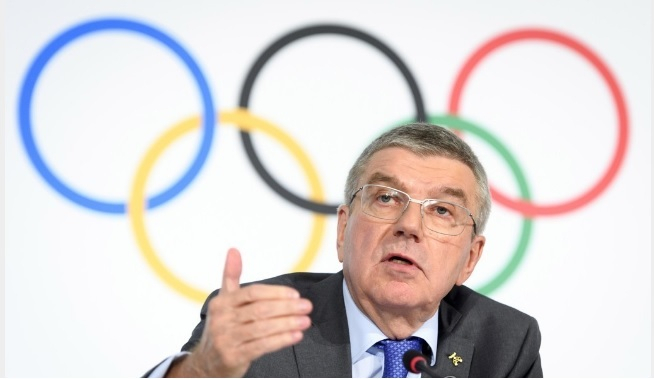 |
IOC President Thomas Bach (Yonhap) |
With South Korea preparing to open the fourth edition of the Winter Youth Olympics next week, International Olympic Committee President Thomas Bach believes the event will offer "a very enriching experience for everybody."
In an online interview with Yonhap News Agency on Tuesday, 10 days before the start of the youth competition in Gangwon Province on the east coast, Bach acknowledged that the level of interest in and awareness of the Youth Olympic Games, whose history only dates to 2010, is "by nature not so high" as the regular Olympic Games. But he insisted there will be so much for visitors to Gangwon to do on the sidelines, in addition to attending matches or races on the ice, track and slope.
"The experience and legacy will be very tangible and all visitors will have the opportunity to be a part of this Winter Youth Olympic Games," Bach said from his office in Lausanne, Switzerland, listing off festivals, sports initiation programs, sports experience programs and meeting with young athletes.
"There will be many opportunities not only to watch and to be a spectator, but also to be a participant in these Winter Youth Olympic Game: getting familiar with winter sports and the joy winter sports can bring to people on one hand, and on the other hand, to have this unique experience to get to know 80 different cultures and different national Olympic committees. Altogether, it will be a very enriching experience for everybody there."
The youth competition will run from Jan. 19 to Feb. 1, with the IOC having contributed $35 million in addition to covering travel expenses and accommodations for all athletes.
The first three editions were all held in Europe -- Austria, Norway and Switzerland -- and will now come to Asia for the first time. That significance was not lost on Bach.
"I think it's evidence of the ever-increasing interest in winter sport in Asia," he said. "We have now the third consecutive big Olympic winter sports event in Asia. We started this cycle with PyeongChang 2018, then Beijing 2022 and now we are back to Korea in 2024. These Youth Olympic Games mean that, on the one hand, we greatly benefit from the legacy of PyeongChang. And on the other hand, since it's Youth Games, we're also building on this legacy for the future with these young winter sport athletes."
Bach noted that 341 Youth Olympic Games alums competed in Beijing and won 53 medals, including 24 gold medals.
"This shows how these Youth Games are leading the way to the future of Olympic winter sports," Bach added.
The legacy of PyeongChang can also be found at facilities for Gangwon 2024. Several competition venues from the 2018 PyeongChang Winter Olympics will be back in use for Gangwon 2024, including those for ski jumping, biathlon, sliding events, figure skating, short track speed skating, speed skating, curling and hockey.
Bach said the IOC had long been behind South Korea's plans to reuse venues from PyeongChang 2018 soon after the Olympics.
"We wanted to support these legacy programs. We wanted to support further development of winter sports in Korea and in Asia," he said. "The legacy programs which had started even before PyeongChang 2018 have continued and are now having a great impact again on the Winter Youth Olympic Games."
Also, Bach praised the work of the PyeongChang 2018 Legacy Foundation, headed by an IOC member from South Korea, Ryu Seung-min, for their effort in helping raise interest in winter sports, especially in countries with little winter sports tradition.
Thanks to New Horizons camps run by the foundation, Tunisia will make its Winter Olympics debut -- senior or youth -- in Gangwon this month.
"That's a really great success. They're accompanied by the great success of the Dream Program, where you had 2,500 youngsters from 97 countries taking part in winter sports activities," Bach went on. "You can really see a very holistic and well-established legacy program around these Youth Olympic Games, again benefitting from the success of PyeongChang 2018."
Bach said a successful Gangwon 2024 will help send young athletes on a path to further Olympic glory, while also keeping the level of interest in winter sports in South Korea high.
"The success of such Youth Olympic Games consists of two things: one is to motivate the athletes to continue their Olympic journey toward the Winter Olympics, in this case to Milano Cortina 2026, and at the same time, to become more familiar with Olympic Values, with Olympic mission of peace and understanding amongst each other," Bach said.
"The success will also be determined by an increased interest in winter sports in Gangwon Province and overall Korea, again strengthening and bringing forward the legacy of PyeongChang 2018, and then for the people of Gangwon Province and all Korean visitors to these Winter Youth Olympic Games to make it an unforgettable experience of having the athletes and cultures from 80 NOCs from around the world being assembled there in Gangwon, sharing the values and unique experience such a Winter Youth Olympic Games can offer to everybody."







